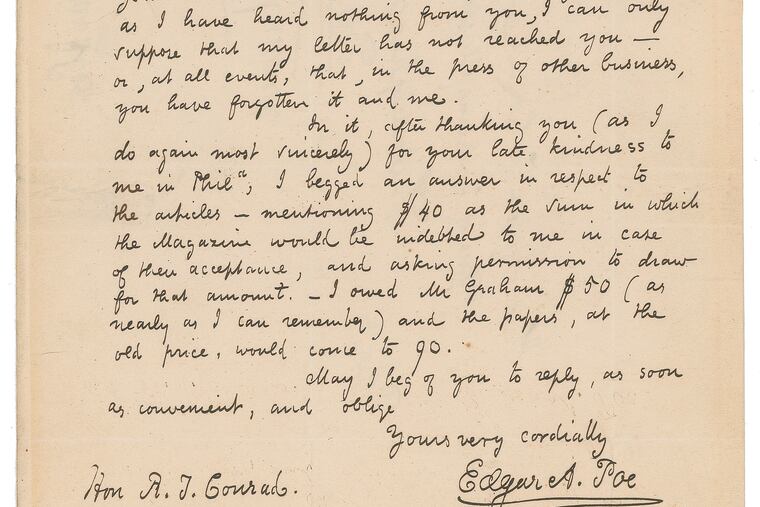Edgar Allan Poe’s letter pleading for $40 from a Philadelphia editor sells 173 years later for $125,000
Quoth the raven, “Sold for $125,125!”

Once upon a year so dreary, while Poe lay dead and the living weary
Appeared a quaint and curious letter of forgotten lore.
In the middle of a pandemic and a vote, suddenly there came a note
Of a long ago anecdote, between Poe and a Philadelphia man of yore.
A handwritten letter in which author Edgar Allan Poe politely pleads for $40 from a Philadelphia editor sold at an online auction this month for a sum that would make even the tell-tale heart skip a beat: $125,125.
Bobby Livingston, executive vice president of RR Auction, the Boston-based auction house that conducted the sale, said the document was among the finest of Poe’s letters, given its excellent condition, the content, and “the insight it gives you into this iconic figure."
“Here he’s writing to a magazine editor basically begging for money,” Livingston said. “The person behind these incredible psychological thrillers and macabre tales was in fact struggling and could maybe relate to the chaos around him.”
We here in the year 2020 feel you, Poe.
The letter, dated Aug. 31, 1847, was addressed to Robert Taylor Conrad, a Philadelphia lawyer, playwright, and editor of the popular Graham’s Magazine, who went on to become the first post-consolidation mayor of Philadelphia after the city and the county became one in 1854.
“It is now a month since I wrote you about the two articles I left with you — but, as I have heard nothing from you, I can only suppose that my letter has not reached you — or, at all events, that, in the press of other business, you have forgotten it and me,” Poe wrote to Conrad.
According to Livingston, the letter was sold 15 years ago by a man in France and reappeared at auction last year. A client of RR Auction purchased the letter and brought it back to the United States.
On Oct. 7 — the 171st anniversary of Poe’s mysterious death in Baltimore— the letter was sold to a bidder on the West Coast who requested to remain anonymous.
“Unfortunately, it did not come home to Philadelphia, but it’s in excellent hands and will be cherished and curated,” Livingston said.
Poe lived in Philadelphia from 1838 to 1844, and his time here is considered to be a seminal point in his writing career, according to Edward G. Pettit, manager of public programs at The Rosenbach and a local historian known as “Philly Poe Guy.”
While Philadelphia was the magazine capitol of the world at the time, every year Poe was here the city experienced a major riot on the streets, and the outbreak of diseases like cholera made life arduous, Pettit said.
“The inspiration he got here might not be the inspiration some people would want but it is existentially important to the quality of the work he produced,” Pettit said.
Among the stories Poe wrote while living in Philadelphia were The Tell-Tale Heart, Murders in the Rue Morgue, and The Masque of the Red Death.
“If you read Poe in school, he probably wrote that story in Philadelphia,” Pettit said. “Philadelphia was the crucible of Poe’s imaginative genius.”
Not only did Poe write for Graham’s Magazine, but he served as its literary editor for a period, too, during which time the publication’s circulation skyrocketed, Pettit said.
National Park Service Ranger Paul Campbell, who is often detailed to the Edgar Allan Poe National Historic Site in Philadelphia (which remains closed due to COVID-19 regulations), said what stood out to him about the auctioned letter was not only Poe’s distinctive handwriting, but also the amount for which it sold.
“There’s an incredible irony that here he is asking for money, not a great amount — $40, and the very paper he wrote it on is now selling for $125,000,” Campbell said. “Here was a person who struggled with financial difficulties through his whole adult life. I can only imagine what he’d be thinking now if he knew."
Not only did the final bid on this Poe letter exceed winning bids of seven previous Poe letters sold by the company (which went for between $60,000 and $80,000), it far exceeded winning bids at the same auction for a handwritten scientific manuscript by Albert Einstein, which sold for $28,185, and a manuscript signed by George Washington, which went for $28,125.
“All three are very important figures in popular culture, but Poe lived such a short life that there are less available materials to begin with,” Livingston said. “The scarcity of Poe makes him stand out.”
Pettit, who has long argued that Philadelphia has a greater claim to Poe than Baltimore, said the letter shows that even after he left Philly, Poe remained connected to the literary culture here.
So what might Poe write of this strange year, if he were alive today?
“He did write about this year, it’s called The Masque of the Red Death,” Pettit said, of Poe’s short story about a prince who tries to avoid a plague while also hosting a party. “The prince thinks ‘I’ll have a party. I don’t have to follow any rules.' And guess what? They all got sick."